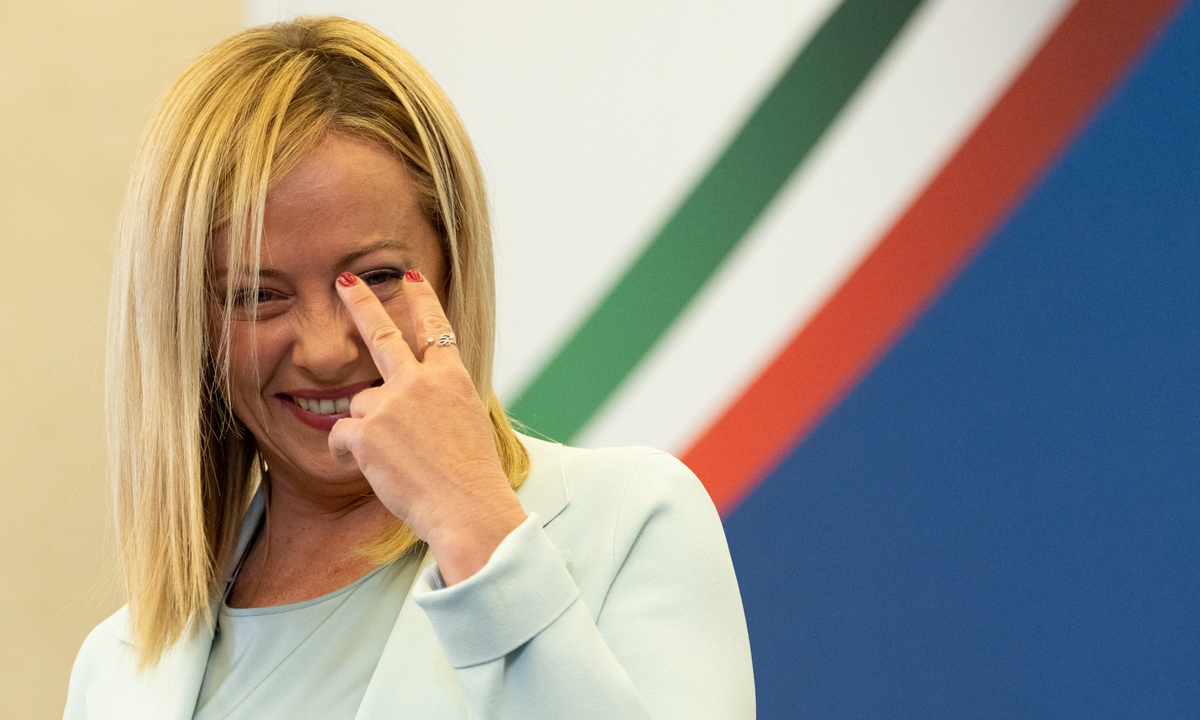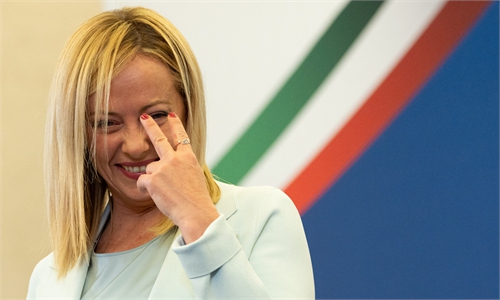
Leader of Fratelli d'Italia (Brothers of Italy) Giorgia Meloni makes the victory gesture during a press conference at Parco dei Principi Grand Hotel in Rome, Central Italy, on September 26, 2022. Photo: AFP
With the last ballots having been counted, Italy is now at a historical turning point. A clear majority is consolidating behind what will likely be the first female prime minister in the history of the country and also the most far-right government since the end of World War II.
Giorgia Meloni and her Brothers of Italy party gained a solid 26 percent of first preferences, compared to the 4 percent obtained in the 2018 elections. Her coalition with Silvio Berlusconi's Forza Italia and Matteo Salvini's Lega collected 44 percent of votes together that, thanks to the current electoral law, should give them a comfortable 60 percent majority in Parliament. It is more than enough to steer the political future of the country in their direction, but probably not sufficient to modify the Constitution without seeking a wider consensus.
Meloni was able to capitalize on the general discontent caused by the growing economic crisis. Being in the opposition allowed Meloni to distance herself from unpopular decisions that the current government had to make in order to deflect from the effects of the pandemic and the war in Ukraine. At the same time, Brothers of Italy was able to erode the electorate share of its allies, Forza Italia and Lega, juggling between political compromise in their national unity government with the left parties and the demands of their right-wing electorate.
The Brothers of Italy has its roots in the post-fascist parties that evolved during the post-war history of the country. Meloni has often shied off accusations of being sympathetic of the fascist heritage that her party carries, broadcasting a more institutional and reassuring image of herself during the electoral campaign.
Movements such as CasaPound, an Italian neo-fascist group born as a network of far-right community centers, still form the backbone of the party and its members have been filmed, in several occasions, performing the fascist salute and carrying neo-nazi symbols.
Still, it is not that a totalitarian fascist regime will run Italy. Its very membership in the European Union and its relying on European funds are a boundary that even the most radical politician can't afford ignoring. Italy will stand loyal to the EU and NATO.
But are these enough to convince the other European leaders that Italy's future government will be a reliable and stable partner? Probably not. And surely not in the short term. With the exception of the messages received from Hungary's Prime Minister Viktor Orban and from the far-right parties all across Europe, the reactions of the European leaders have been far from warm. The rise of the far-right parties across Europe is generating concerns in all the palaces of power, and the victory of Brothers of Italy resonates as an encouragement for all those populist parties that are seeing their consensus growing in a Europe on the brink of economic recession.
Meloni has won the elections, but the celebration will be a very short one. She will soon need to govern the country during one of its hardest times in past decades. She inevitably will have to compromise but at the same time she will need to keep the promises she was making in the opposition of Mario Draghi's government. The real challenge for her will be to avoid the fate that brought the populist Five Star Movement, from winning 32 percent in the 2018 elections, to a much less appealing 15 percent only four years later; or her ally Salvini from 34 percent in the European elections of 2019 to a nerves shaking 8 percent.
Strong of her 26 percent, Meloni should not forget that the real winner of this elections has been the "party" of non-voters. 36 percent of Italians decided not to vote, the highest abstention in the republican history. A majority "party" needs guidance and a vision, of which none of the newly elected MPs, from across the aisle, managed to express. This is a reflection that all parties, from left to right, will necessarily be having once the dust has settled on the ballots.
The author is an Italian freelancer. opinion@globaltimes.com.cn


